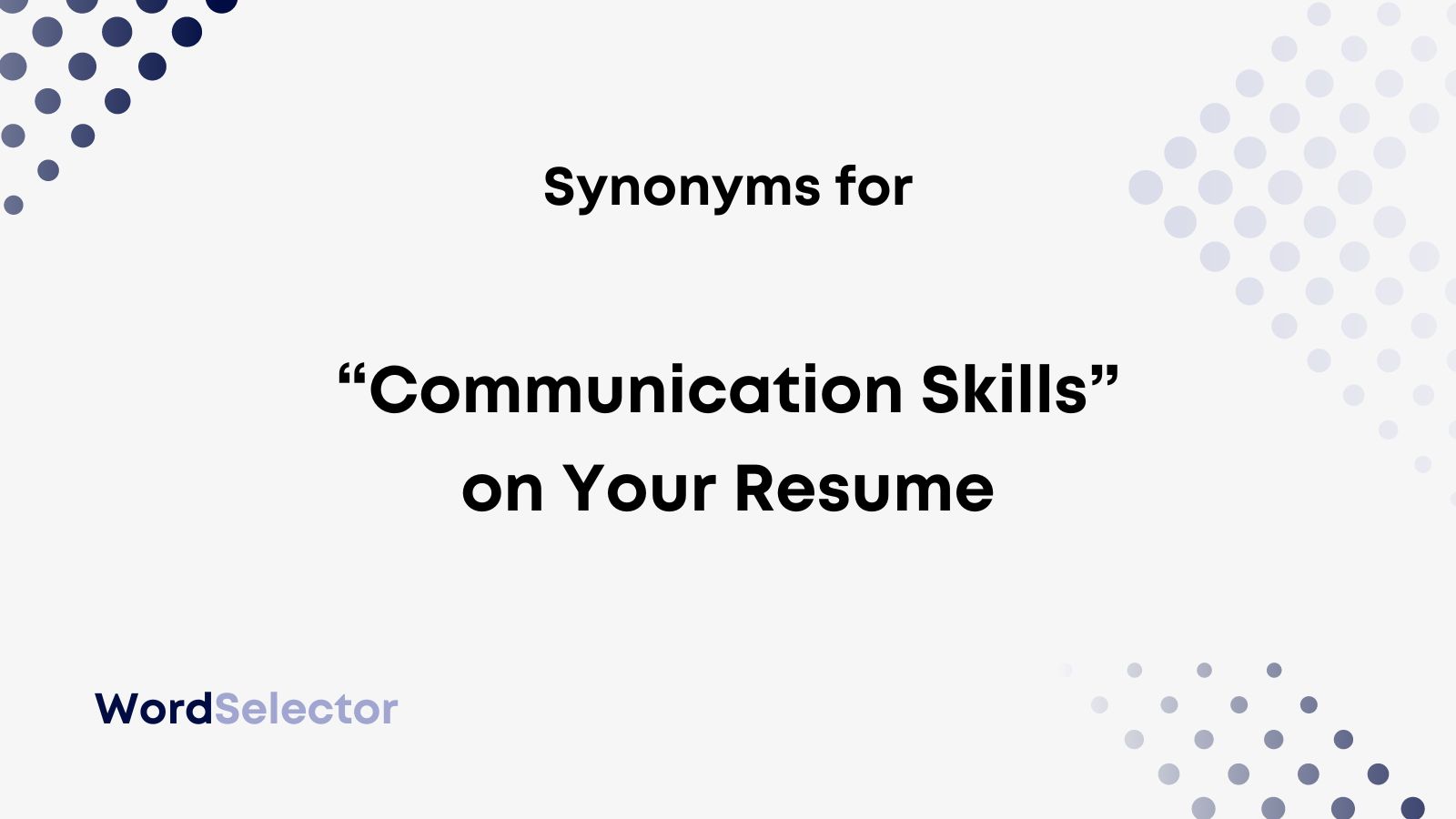Master Communication Skills: Synonyms for Effective Interaction

In today’s interconnected world, mastering communication skills is essential for success in both personal and professional spheres. Effective interaction goes beyond mere words; it involves clarity, empathy, and precision. One powerful tool to enhance your communication is the strategic use of synonyms. Synonyms not only add variety to your language but also help you convey nuanced meanings, making your messages more engaging and impactful. Let’s explore how synonyms can transform your communication skills and provide practical ways to integrate them into your daily interactions.
Why Synonyms Matter in Communication
Communication is an art, and synonyms are the colors on your palette. They allow you to paint vivid pictures with words, ensuring your message resonates with your audience. For instance, instead of repeatedly using “important,” you could say “crucial,” “vital,” or “significant” to emphasize different shades of priority. This not only prevents monotony but also demonstrates your command of language.
Moreover, synonyms can help you tailor your message to different contexts. In a formal setting, you might use “utilize” instead of “use,” while in a casual conversation, “grab” might replace “obtain.” This adaptability makes your communication more effective and audience-appropriate.
Key Synonyms for Common Communication Phrases
To help you get started, here’s a list of synonyms for commonly used phrases, categorized by their purpose:
1. Expressing Agreement
- Instead of “Yes,” use: “Absolutely,” “Indeed,” “Certainly,” “Without a doubt.”
- Instead of “I agree,” say: “I concur,” “That aligns with my thoughts,” “You’ve hit the nail on the head.”
2. Showing Disagreement
- Instead of “No,” use: “Not necessarily,” “I’m not convinced,” “That’s debatable.”
- Instead of “I disagree,” say: “I see it differently,” “I’d like to offer another perspective,” “That’s not entirely accurate.”
3. Emphasizing Points
- Instead of “Important,” use: “Crucial,” “Vital,” “Pivotal,” “Indispensable.”
- Instead of “Very,” say: “Extremely,” “Remarkably,” “Exceptionally,” “Profoundly.”
4. Seeking Clarification
- Instead of “What do you mean?” ask: “Could you elaborate?” “Can you clarify that?” “What’s your perspective on this?”
- Instead of “I don’t understand,” say: “I’m not following,” “Could you explain further?” “I’m having trouble grasping that.”
5. Providing Feedback
- Instead of “Good job,” say: “Well done,” “Outstanding work,” “You’ve outdone yourself.”
- Instead of “That needs improvement,” suggest: “There’s room for growth,” “Let’s refine this,” “We can enhance this further.”
Practical Tips for Using Synonyms Effectively
Context is Key: Always consider the context before choosing a synonym. A word that works in a casual setting might sound out of place in a formal environment.
Avoid Overuse: While synonyms add variety, overusing them can make your speech or writing sound contrived. Balance is essential.
Understand Nuances: Synonyms often carry subtle differences in meaning. For example, “happy” and “ecstatic” both convey joy, but the latter is more intense. Choose words that match the emotion or idea you want to express.
Practice Regularly: Incorporate synonyms into your daily conversations and writing. The more you practice, the more natural it will feel.
Use Tools: Leverage dictionaries, thesauruses, and language apps to expand your vocabulary. Tools like Merriam-Webster or Power Thesaurus can be invaluable resources.
Real-World Applications
In the Workplace
- Meetings: Instead of saying, “We need to focus on this,” try, “Let’s prioritize this issue.”
- Emails: Replace “I’m writing to inform you” with “I’m reaching out to share” for a more engaging tone.
In Personal Relationships
- Apologizing: Instead of “I’m sorry,” say, “I deeply regret my actions.”
- Expressing Gratitude: Replace “Thank you” with “I’m incredibly grateful” for a more heartfelt message.
In Public Speaking
- Engaging the Audience: Instead of “This is important,” say, “This is a game-changer.”
- Concluding Remarks: Replace “In conclusion” with “To wrap up” for a more conversational tone.
Expert Insights
Dr. Jane Thompson, Communication Psychologist: "Synonyms are not just about replacing words; they’re about connecting with your audience on a deeper level. When you use the right synonym, you show that you’ve considered their perspective, which builds trust and rapport."
Common Misconceptions About Synonyms
Myth: Synonyms mean the same thing.
Reality: While synonyms share similar meanings, they often have distinct connotations. For example, "slim" and "skinny" both describe thinness, but "slim" is generally more positive.
Myth: Using synonyms makes you sound pretentious.
Reality: When used appropriately, synonyms enhance clarity and engagement. The key is to match the tone and context of the conversation.
Future Trends in Communication
As technology continues to shape how we interact, the importance of clear and nuanced communication will only grow. With the rise of AI and global connectivity, mastering synonyms and language variety will be crucial for standing out in a crowded digital landscape. Additionally, cross-cultural communication will require a deeper understanding of how words are perceived in different contexts, making synonyms an essential tool for global professionals.
Key Takeaways
- Synonyms enhance communication by adding variety and nuance.
- Choose synonyms based on context, audience, and intended tone.
- Practice regularly and use tools to expand your vocabulary.
- Effective communication is a skill that can be honed with intentional effort.
FAQ Section
How can I improve my vocabulary to use more synonyms?
+Read widely, use vocabulary-building apps, and practice writing or speaking with a thesaurus handy. Consistent exposure to new words will naturally expand your vocabulary.
Are there any synonyms I should avoid in professional settings?
+Avoid overly casual or slang synonyms in formal settings. For example, "cool" might be inappropriate in a business email, but "impressive" works well.
Can using too many synonyms confuse my audience?
+Yes, overusing synonyms can make your message unclear. Focus on using them to enhance, not overwhelm, your communication.
How do I know if a synonym fits the context?
+Consider the tone, formality, and emotional weight of the word. If it aligns with your message and audience, it’s likely a good fit.
What’s the best way to practice using synonyms in conversations?
+Start by identifying one or two synonyms you’d like to use and consciously incorporate them into your daily interactions. Over time, this will become second nature.
Mastering the use of synonyms is a powerful way to elevate your communication skills. By understanding their nuances and practicing regularly, you can convey your messages more effectively, build stronger connections, and leave a lasting impression. Whether in the boardroom or the living room, the right words make all the difference.



